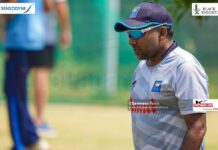The Federation of International Touch (FIT) is a not-for-profit International Sports Organisation (ISO) or International Federation (IF) registered in New South Wales, Australia under the 2009 Associations Incorporation Act.
FIT was established in Melbourne, Australia on 24th March 1985 to celebrate the conducting of the first international test match played between Australia and New Zealand. Foundation members present at the inaugural meeting were Australia (FIT Membership No 1), Fiji (FIT Membership No 2), New Zealand (FIT Membership No 3) and Papua New Guinea (FIT Membership No 4).
During the preceding period 1962 to 1985 there had been many informal exchanges between Australia and New Zealand at club, district and state / international levels. During those exchanges several international meetings were held to consider the formation of an ISO, the proposed global structure and the international playing rules.
Touch evolved from the sport of Rugby League Football in the mid-1960s in the South Sydney region of Australia. The prime reasons for the evolution of the sport relate to a lack of physical contact together with an absence of injury – the initial participants were ageing ex-Rugby League players. The earliest versions of the game simply removed scrums, tackles and most kicking from the normal Rugby League playing rules and reduced the size of the field and the number of players to meet local demands. The global sport of Touch evolved from that rudimentary activity almost 50 years ago and FIT evolved due to the growing demand for an organisation and structure to control the global popularity of the competitive sport.
The sport of Touch is both a community sport and an elite sport. Touch is one of the very few sports in which families can compete against families in a safe environment and at the other end of the scale national representative teams can compete in test matches at the highest elite level. By the very nature of the game, the associated playing rules and the minimal physical contact, Touch is popular amongst youth and aged, large and small and certainly amongst both genders. The Federation has a policy directed towards both gender and regional diversity on our governance and operational committees. Touch is also one of the very few sports where men and women can participate in mixed gender divisions at both the community level and at elite World Championship standard.
Since 1985 FIT has conducted seven Touch World Cups in the following countries: 1988 in Australia, 1991 in New Zealand, 1995 in United States, 1999 in Australia, 2003 in Japan, 2007 in South Africa and 2011 in Scotland. At the 2011 event in Edinburgh in addition to 100 FIT referees, more than 1,000 participants in 95 teams from 27 countries were involved. The 2015 Touch World Cup (TWC) is to be conducted in NSW
Australia and participation by close to 50 countries is anticipated. In addition to the TWC there are also regional and sub-regional Touch championships delivered around the globe every two years. The largest of these is the European Touch Championships which now boasts close to 20 countries.
The sport of Touch is a six-a-side invasive field game played on a 70M x 50M grassed pitch with an oval shaped ball. The object of the sport is to score more touchdowns than the opposition. Touchdowns are scored by a player in possession placing the ball on or over the attacking scoreline before being touched by an opposition player. No body contact is allowed and the mixed gender format is popular.
1. Beach Touch: Played with 5 players and modified rules on 30M x 15M sand based pitch; and
2. Indoor Touch: Played with 5 players and modified rules on an indoor court with variable dimensions dependent on facility.
FIT has issued three editions of the FIT Playing Rules since 1986 and the fourth edition is due for release in 2013. The rules of Touch are simple. The FIT Playing Rules incorporate a unique ‘Drop Off’ system when scores are even and progression is required – i.e. to avoid drawn matches. The Touch ‘Drop Off’ system is an objective and fair system, all team players are eligible to participate and the system is based on team work and all game skills.
The Playing Rules of Touch and the manner in which they are applied dictate the competitiveness, open style of play and the very attractive nature of the game. Each segment of a community is able to associate with the sport. In fact finding a suitable volunteer for an administrative or technical role is a regular concern primarily because everyone wants to, and is able to, play. The skills are simple and easy to learn. There is little danger of serious injury. The predominantly outdoor (summer) sport is family friendly, interesting because of the tactical challenges and necessary teamwork, and is suited to all sizes and all ages in either social or elite competition.
Women are attracted to Touch because of the low contact nature of the sport, absence of a ‘macho’ image, success is skill based and the lack of physical violence. Anecdotal evidence suggests that around 35% of worldwide participants are female. Additionally, 49% of technically accredited, Level 1 coaches in Australia, are women. The FIT Board recently resolved to endorse the Brighton Declaration, a worldwide endorsement of gender equality. FIT is currently negotiating with IWG officials regarding the signatory process and has provided FIT data to the Sydney Scoreboard group.
Children participate in Touch without the fear of injury. Because the game is inherently based on honesty, all participants quickly learn about sportsmanship and fair-play. As a team ball sport they soon identify the value of inclusiveness and teamwork. FIT member resources include numerous referee and coaching materials and a Leaders Resource kit containing a DVD with 42 fun activities for kids, as well as a CD containing session plans, examples, templates, adjustable documents, flyers, logos and information. A ‘Touch for Juniors’ book is also available which includes rules, game terms and Code of Conduct information.
The sport is most suitable for school children and some 500,000 schoolchildren participate in regular competition in the State of Queensland. The Federation’s Code of Conduct and Member Protection Policy are included with event administrative documents, frequently promoted and is available on the FIT and major event web sites. The Code is specific to players, referees, coaches, officials, parents and supporters. To qualify and become accredited through coach, referee and selector technical education programs, each participant is required to sign and submit a Code of Behavior document, retained on file at domestic level. Under the Member Protection Policy (designed to prevent discrimination, harassment or abuse), event Member Protection Officers are required to be appointed for all Tier 1, Tier 2 and Tier 3 international competitions.
In support of the FIT philosophy of ‘the sport for all’ one clear objective of the Federation is to ensure positive, enjoyable and safe activities are provided for people playing touch. FIT seeks to ‘ensure equal opportunities are provided regardless of a person’s gender, race, ability, cultural background, religion, geographical location or age’. Recent development in Muslim communities has initiated a review of the FIT player and referee uniform policies.During the period 1986 through to the turn of the century, popularity of the sport spread around the world, especially in Oceania and in Europe. By the year 2001 there were 21 FIT members. Since 2001 there has been a major increase in membership and the Federation now has 51 members worldwide – Africa, 4; America, 4; Asia, 13; Europe, 19; and Oceania, 11. Potential new FIT members continue to be assisted and assessed.
As at 31 December 2012 FIT members include the following countries: Afghanistan, Argentina, Australia, Austria, Belgium, Catalonia, Chile, China, Chinese Taipei, Cook Islands, Czech Republic, Egypt, England, Fiji, France, Germany, Guernsey, Hungary, India, Iran, Ireland, Italy, Japan, Jersey, Kenya, Kiribati, Luxembourg, Malaysia, Mauritius, Monaco, Netherlands, New Zealand, Niue, Pakistan, Papua New Guinea, Portugal, Samoa, Scotland, Singapore, Solomon Islands, South Africa, Spain, Sri Lanka, Switzerland, Tonga, Trinidad & Tobago, Turkey, Tuvalu, United Arab Emirates, United States & Wales.
Developing Nations include the following countries: Bangladesh, Brunei, Canada, Korea, Nepal, Philippines, Thailand and Tokelau.
Touch Referees around the world are educated under a structured and standardised process, with game outcomes a priority. There are three technical program levels – Basic, Intermediate and Advanced. In the majority of cases, these programs are aligned to Referee Badge Levels: Basic is entry level to community refereeing and is set up to assist development at “grass roots” or park level;• Intermediate level is for Referees that become more interested in further development and seek a career path in representative Touch; and Advanced level is the stage when a Referee has chosen his/her career path and is advanced enough to undertake refereeing at National and International standards.
All referee education programs incorporate incremental steps to ensure the referee satisfies the competencies set in each program. Each program, involving coursework and home studies, is geared toward game and player outcomes with all delivery systems directed towards the attitude of achieving equality and excellence in referee performances and professionalism. A new online FIT Introductory Referee Course has been developed and released in August 2012. The online Intermediate Course nears completion.
In 2012 FIT established the FIT Coaching Commission to standardise and promote international coach education programs. Coach education programs are available for the community level, the basic park level and the advanced level. Game expertise is growing around the globe partially due to the support of the two powerhouse members, Australia and New Zealand. These world-ranked number one and number two FIT members provide coaches and coach presenters to raise international standards and assist smaller members to technically develop.
FIT has applied for membership of SportAccord. Several FIT members are currently applying for recognition or endorsement by government authorities, national sporting councils, and domestic Olympic or Commonwealth Games authorities. The following are details of current recognition of domestic National Touch Associations and Federations:
Country (NTA) Recognition Authority (IOC, Government or NSA) Australia Australian Government, Australian Sports Commission (ASC)Austria -Austrian Government, BDP – Republik Osterreich Wein, Catalonia – Catalan Government. Cook Islands – CASNOC & NOC, Fiji- NOC and Commonwealth Games, France – Government Prefecture De L’isere Department of Sports, Guernsey -Guernsey Sports Commission (GSC), Italy – Associazone Italiana Cultura Sport (AICS), Japan – National Recreation Association Japan (NRAJ) Membership, Jersey – Jersey Sports Council and Education Sport & Culture Dept, Malaysia -AKTAP EMBANGUNANS UKAN (Malaysia Sports Commission), New Zealand – Sport and Recreation New Zealand (SPARC), Niue – Government and Commonwealth Games, Papua New Guinea -NOC, Commonwealth Games and PGN Sports Federation, Scotland – Scottish Sport and Recreation Association, South Africa – Sport and Recreation South Africa, Tonga – NOC, Commonwealth Games and Tonga Sports Associations About Touch & Federation of International Touch (FIT) www.international-touch.org, Tuvalu – NOC and Ministry of Education, Youth & Sports, Wales -Wales Sports Association
www.international-touch.org

























